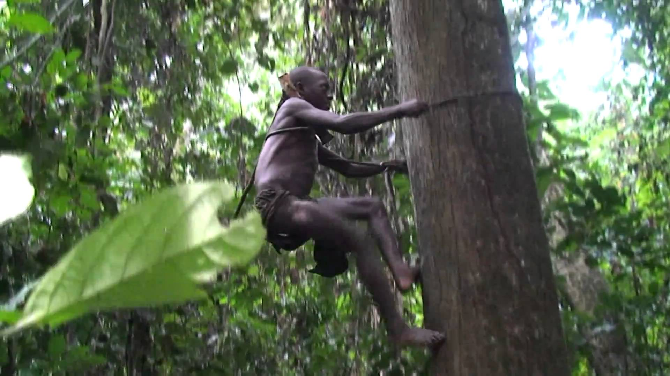That might sound like a lot of hard work; yet in the 20th century anthropologists repeatedly and consistently reported their surprise upon discovering how little time hunter-gatherers spend working. The average for a healthy adult is under 20 hours per week. Does that sound good?
Not only that, those 20 hours aren’t exactly spent doing the same door-to-door survey over and over again, or answering 1000 calls on the customer service line with the same cheerful greeting. Hunter-gatherer societies tend not to have specialists (other than the odd male/female work division); in other words, everybody does everything, from hunting, to making jewellery, to camp-building.
These are multi-talented people, and by the way most of them are multi-lingual as well (not bilingual — multi-lingual). And their offices are not Little Chefs and car-parks but areas of outstanding natural beauty. And they don’t keep time, they work whenever they like. And if they want to move camps they just move; who’s going to stop them?

They also tend to get on well with the people they work with, for the simple reason that they grew up together and are normally related in some way. Civilised people have to adapt to living and working in a world where the majority of people they work with and live near fundamentally don’t really care about them very much.
To make this tolerable they have to be inhibited and formal a great deal of the time. People unable to support themselves, such as old people, are marginalised. Children spend the majority of their days bringing themselves up under the tenuous supervision of a single paid stranger.
Not so hunter-gatherers. Hunter-gatherers live, work and socialise in a mutually dependent group, forging very strong bonds of attachment, dancing and singing regularly and communally in a way which puts the alienated, badly coordinated shufflings of modern night-clubs and dance-halls to shame. Old people are venerated as wells of wisdom. Children are brought up by a group of adults who knew them when they were babies.
The picture I have presented is overly idyllic and overly generalised (also note that the great majority of tribal people in the world are not hunter-gatherers, though many share some of the features mentioned here). The lifestyles, locations and living standards of hunter-gatherers across the world vary wildly and they are extremely vulnerable to the whims of uncaring nature and the relentless advance of the diggers. But Hobbes was only one third right. Hunter-gatherer’s lives are not Nasty, Brutish and Short. They are Meaningful, Exciting and …. Short.
As writers and film-makers through history have noticed, from Montaigne and Rousseau to Apocalypto,Walkabout and Baraka, there is something deeply and intuitively attractive about the freedom, sociability and romance of the hunter-gatherer lifestyle. Perhaps it is an evolution thing. But whatever it is, homo-sapiens are having a hard time kissing those 190,000 wilderness years goodbye for ever.
☛ READ NEXT:
African Pygmy Tribesman Kept In Zoo
Cargo Cults – Humans Will Believe Anything















